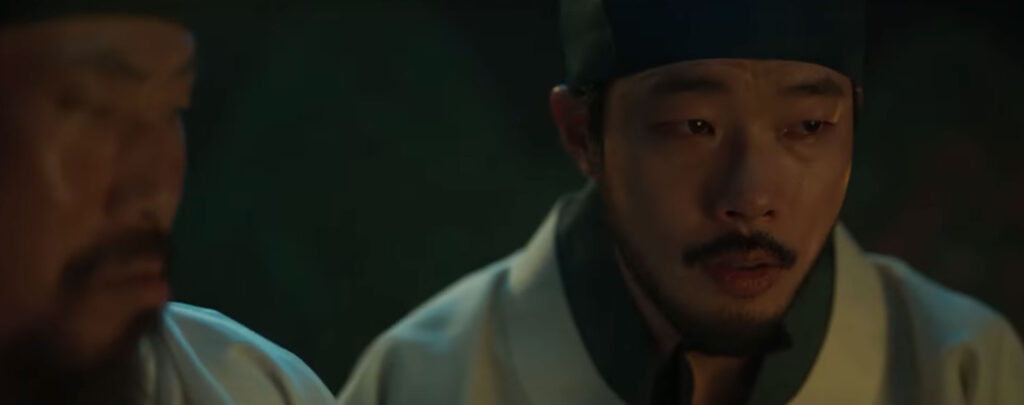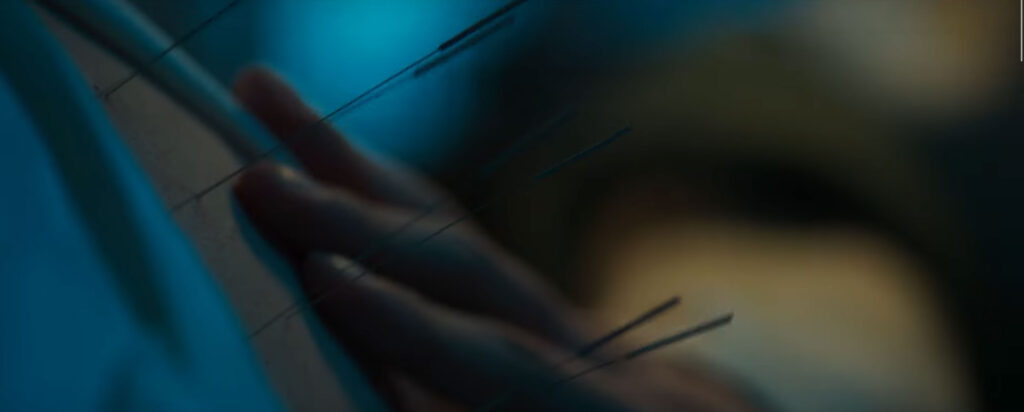Ahn Tae-jin, Choi Moo-sung, drama, Jo Yoon-seo, Kim Do-wan, Kim Sung-cheol, Kim Ye-eun, Korea, Lee Joo-won, movies, Park Myung-hoon, reviews, Ryu Jun-yeol, The Night Owl, Yoo Hae-jin
December 21, 2022
by Carla Hay

Directed by Hwang In-ho
Korean with subtitles
Culture Representation: Taking place in the Korean kingdom of Joseon, in 1645 and briefly in 1649, the dramatic film “The Night Owl” features an all-Korean cast of characters representing the working-class and middle-class.
Culture Clash: A partially blind acupuncturist, who goes to work for the empire’s royal family, witnesses the murder of the prince who was the empire’s direct heir, and the acupuncturist finds himself in a battle with the king, who wants to abide by the official cause of death as malaria.
Culture Audience: “The Night Owl” will appeal primarily to people who are interested in watching “slow burn” movies that combine murder mysteries with political intrigue that’s partially based on real-life historical figures.

“The Night Owl” has a title that is meant to describe movie’s wise protoganist, who is nocturnal by nature and sees things at night that he won’t necessarily reveal right away. It’s a somewhat slow build to the most suspenseful parts of this political crime drama. And the movie’s ending is a bit too contrived. However, most of “The Night Owl” is a well-acted thriller, partially inspired by real Korean history of the 1640s.
Directed by Ahn Tae-jin, “The Night Owl” takes place in Korean kingdom of Joseon, in 1645 and briefly in 1649, during the Joseon Dynasty. Ahn co-wrote the fictional screenplay with Soo-in Bang and Gyu-Ri Hyun. Even though the movie is fictional, it features some portrayals of real-life historical figures and events. “The Night Owl” takes a well-known Korean legend about the mysterious death of a real prince and shows it from the perspective of a fictional and partially blind acupuncturist who was hired by the royal family and who witnessed the death.
The opening scene of “The Night Owl” takes place around 6 a.m. on April 27, 1645. The acupuncturist—a mild-mannered man in his 30s named Chun Kyung-soo (played by Ryu Jun-yeol), also known as Chun Geyong-su—is frantically running out of the royal palace while carrying a boy on his back. Viewers later find out that the boy is the king’s 10-year-old grandson Yi Seok-cheol (played by Lee Joo-won), who also looks very frightened because his father has died under mysterious circumstances. “The Night Owl” returns to this scene near the end of the movie, and viewers will know by then why these two are running away from the palace.
The movie then cuts to a scene of Kyung-soo with two other men in acupuncture training because they hope to be hired as physicians for the royal family. The salary is high enough that one of the men remarks, “We can be rich if we become royal physicians.” Kyung-soo has become an expert in acupuncture, and his services will soon be sought-after by the royal family.
Kyung-soo happens to be partially blind. During the day, he cannot see, but at night, he has very limited vision. He doesn’t tell most people that he can somewhat see at night. Kyung-soo leads most people t believe that he is completely blind at all times.
Kyung-soo, who is a bachelor with no children, has a very personal reason for wanting to get high-salary job: His 10-year-old bother Kyung-Jae (played by Kim Do-wan) has an unnamed medical condition that requires herbal medicine that Kyung-soo has been struggling to afford. There is no mention of what happened to the brothers’ parents, but they are presumably dead, since Kyung-soo is Kyung-Jae’s only guardian and caregiver. An early scene shows Kyung-soo nearly being evicted because he hasn’t been paying his rent.
Under these dire circumstances, the timing couldn’t be better for Kyung-soo when he find out that his reputation for being an expert acupuncturist has resulted in the royal family’s chief medical staffer Lee Hyung-ik (played by Choi Moo-sung) recruiting Kyung-soo to live and work at the palace. The movie never really explains who’s taking care of Kyung-Jae while his older brother Kyung-soo is away. Kyung-soo is shown writing secret letters to Kyung-Jae, because Kyung-soo doesn’t want people to know that he’s not completely blind.
One of Kyung-soo’s fellow trainees named Man-sik (played by Park Myung-hoon) is hired y the royal family at the same time as Kyung-soo. Man-sik, who is goofy and a little bit irresponsible, likes to see himself as a ladies’ man. His antics are the movie’s main comic relief. Man-sik will often get distracted by ogling at the royal family’s female servants—he gets an instant crush on a court lady named Seo (played by Kim Ye-eun)—and he sometimes sleeps on the job when he thinks Kyung-soo isn’t noticing. Kyung-soo and Hyung-ik have both been assigned to work together during the night shift.
The first third of “The Night Owl” shows Kyung-soo and Mansik getting established in their new living and workng environment at the royal palace. Hyung-ik gives a friendly tour of the royal clinic. Hyung-ik tells him, “Order of rank must be upheld.” Kyung-soo is also told that the king’s only grandchild—a boy named Seok-cheol—has been urinating on himself, but only the people in the royal clinic know.
There’s a possible psychiatric explanation for Prince Seok-cheol’s urination problem: He’s experienced trauma because his father, Crown Prince Sohyeon (played by Kim Sung-cheol), has been in Qing (a part of China) as a hostage for the past eight years. (This captivity happened to the real Crown Prince Sohyeon.) And now, Sohyeon is coming home to Joseon.
The homecoming is fraught with tension becaue Sohyeon’s father, King Injo (played by Yoo Hae-jin) has fallen ill and is wary about greeting his returning son, whom King Injo fears has been brainwashed by the enemy. Sohyeon is the king’s only direct heir. In recent decades, Joseon has already been ravaged by Japanese and Manchus who invaded Joseon. King Injo wants to protect his kingdom from possible interlopers at whatever cost.
Sohyeon’s wife, Crown Princess Minhoe (played by Jo Yoon-seo), and son Seok-cheol are happy and relieved about Sohyeon’s homecoming, which is witnessed by a large crowd of Joseon residents. Minhoe is upset that King Injo can’t drag himself out of bed to greet his son at the homecoming ceremony. And just when it looks like King Injo will skip the homecoming ceremony, he appears at the event and gives Sohyeon a slightly reluctant embrace.
Conversations between Sohyeon and King Injo reveal that Sohyeon grew to trust his Qing captors and believes that Joseon and Qing can reach a compromise to leave peacefully. Sohyeon tells King Injo that the king must adapt to change and not be stuck in old ways of thinking. King Injo is stubborn and skeptical. And the king, who thinks Westerners are barbarians, gets even more suspicious of Sohyeon when he finds out that Sohyeon has been learning and accepting of Western customs.
The tensions between King Injo and Crown Prince Sohyeon continue to build until one night, Sohyeon dies under mysterious circumstances in the early morning (just past midnight) of April 26, 1645. The official cause of death is malaria. However, Kyung-soo saw what really happened: Sohyeon was murdered by poison. The circumstances of the murder are shown in detail, so viewers know who the committed the crime.
Kyung-soo’s dilemma is how to report this murder when people won’t believe that a blind man witnessed it. The killer also covered up the murder, so Kyung-soo must have enough evidence to prove what happened. Meanwhile, Kyung-soo knows that if he comes forward with a claim that Sohyeon was murdered, then Kyung-soo could be at risk of being accused of the crime, since Kyung-soo was one of the last-known people to see Sohyeon alive.
King Injo seems determined to not let anyone doubt that Sohyeon died of malaria. Is he a king who is in denial who doesn’t want any royal scandals, or does King Injo know more than he’s telling? As shown in “The Night Owl” trailer, Kyung-Soo does indeed come forward with an accusation that Sohyeon was poisoned. And King Injo doesn’t it like it one bit.
There’s a “race aganst time” aspect to the story, since Sohyeon’s body will soon be cremated, and his body is one of the main ways that Sohyeon can prove that he is telling the truth. “The Night Owl” has solid acting from all of the cast members, who all give very credible performances. The main conflict in the story comes down to an underdog (Kyung-Soo) versus an extremely powerful person (King Injo), who both want very different narratives about Sohyeon’s death. “The Night Owl,” which gets more tension-filled as it goes along, is a story about truth and justice that shows having the truth on one’s side might not always be enough for justice.
815 Pictures released “The Night Owl” in select U.S. cinemas on December 16, 2022. The movie was released in South Korea on November 23, 2022.
